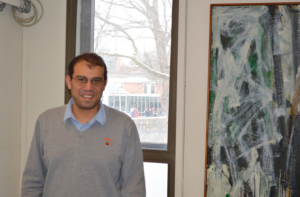At the beginning of the semester, Dr. Jonathan Touboul joined the mathematics department as an associate professor and one of the three faculty members at the Volen National Center for Complex Systems.

Prior to his arrival at Brandeis, Touboul received his Ph.D. in mathematics at the École Polytechnique. Before coming to Brandeis, Touboul was the Principal Investigator (PI) of the Mathematical Neuroscience Team at the Center for Interdisciplinary Research in Biology (CIRB) at the Collège de France. After renewing his position once, Touboul wanted a change of scenery and moved from France to Boston, as a new professor at Brandeis.
Since receiving the job, Touboul has been excited to get onto campus. “I was really excited by Brandeis because both the math and neuroscience programs have very good faculty and really demonstrates a real collegiate atmosphere of collaboration. I felt very welcomed,” he said. As well as the welcoming environment of the students and faculty, Touboul loves the landscape that surrounds campus and the greater Boston area because it is one of the few cities in the United States that closely resembles Europe, he said.
In addition to joining the mathematics department, Touboul was hired by the school to take on the challenge of creating an applied math major. Unlike the existing math major, the applied math major will combine both mathematics and applied sciences to be more applicable to the real world.
Even though Touboul was trained in pure math, he was still curious about body systems and science. After completing his Ph.D., Touboul would go to the library at his institution to read books about the relationship between math and medicine and “was amazed by how mathematics could be used to understand biology.” In France, students can either choose to go to engineering school or medical school. With both his parents in the medical field, Touboul’s parents advised him to continue with engineering school and switch to medical school if he changed his mind. “I was always interested in medicine and was hesitant to go to medical school. But I found applied mathematics and was able to do both,” said Touboul.
Touboul’s research mainly focuses on the modeling and analysis of the systems within the brain. One of his most famous publications revolves around the relationship between positive and negative trends within brain activity. Toubould found that certain fluctuations in activity within a network can cause induced oscillations.
Not knowing the reasoning behind this trend, Touboul wanted to test it with two populations. He decided to use a fashion model. Oftentimes in fashion “Some people want to follow what the majority does, mainstream, and others that would do the contrary, hipsters. And by trying to oppose to the majority, these individuals will eventually all do the same thing at the same time. They will synchronize, and activate at the same.” Indirectly, those trying to be different end up being exactly the same.
For students interested in applying math to science, Touboul hopes to be an effective resource and a tremendous addition to the Brandeis community.



